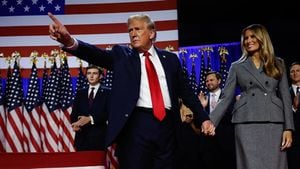Senator John Thune of South Dakota has officially been elected as the new Senate Majority Leader, marking a significant shift within the Republican Party. This leadership transition occurs as Thune succeeds Kentucky's Mitch McConnell, who has held the position of Senate GOP leader since 2007, making this the first major regime change for Senate Republicans since McConnell ascended to the role. Thune's election seals Republicans' control of the Senate following their 53-seat victory amid the 2024 elections, and it holds considerable weight as President-elect Donald Trump returns to the White House.
Thune, at age 63, is entering his fourth term representing South Dakota and remains committed to enhancing collaboration with Trump. Even though both figures have had their disagreements over the years, particularly surrounding Trump's actions during the 2020 presidential elections and the Capitol riots on January 6, Thune is ready to embrace Trump's leadership style. He expressed this sentiment through social media, stating, "Senate Republicans are excited and ready to get to work" with the incoming administration.
The Republican Senatorial elections commenced with Thune facing stiff competition from two other prominent Senate members: John Cornyn from Texas and Rick Scott from Florida. Thune emerged victorious with the backing of his colleagues through two rounds of secret ballots held behind closed doors. While Scott was knocked out during the first voting round, the final ballot showed Thune leading Cornyn with support from 29 senators, compared to Cornyn’s 24 votes.
This shift signifies not only Thune’s personal political success but also emphasizes a broader desire among Republican senators to refresh the party's leadership as they prepare to execute their agenda once Congress reconvenes. Thune acknowledged this responsibility, noting, "It is a new day in the United States Senate," promising to address key issues like border security, energy costs, and regulatory cuts right out of the gate.
There is palpable excitement within the Senate Republican ranks about reclaiming their majority and working alongside House counterparts to realize Trump’s objectives. Thune underscored their commitment, affirming the party has received "a mandate from the American people" to correct the perceived failures attributed to the Biden-Harris administration.
Despite the cordial yet complicated relationship, Thune seems firmly positioned to mediate the sometimes fragmented dynamics of the Senate GOP. His past criticisms of Trump post-2020 have left some wondering if he can effectively balance the desires of Trump's loyal base against moderates posing divergent views. Yet, Thune has made strides to mend fences, including visiting Trump at Mar-a-Lago to discuss future collaborative efforts.
The newly elected majority leader will face pressing challenges, the foremost being how to accommodate Trump's demands for Senate recess appointments, which would enable the instant tasking of cabinet officials without going through traditional confirmation processes. This has sparked speculation about whether Thune will adopt any substantial procedural changes or remain aligned with longstanding Senate traditions surrounding appointments.
Thune aims to embrace unity—not just among Senate Republicans but across party lines—despite the strong Republican control of the chamber. His acknowledgment of the necessity for bipartisan cooperation seems clear through his earlier statements, reinforcing the importance of listening to the voices across the aisle. Nonetheless, there's tension as Trump has called for removing the Senate filibuster threshold, complicifying Thune's strategies to potentially reach bipartisan compromises.
During the leadership elections, many GOP senators hinted at their preference for continuity, indicating their desire to maintain ties with Thune’s moderate approach, which has mostly aligned with traditional Republican priorities. This point is key as the Senate prepares to discuss and enact various policies over the next two years under unified Republican control. If all goes as planned for Thune, Republicans hope to expedite the confirmation of Trump's nominees and begin addressing the national debt and immigration policies immediately.
Thune’s career has largely evolved around policy oriented toward promoting traditional Republican values, championing initiatives aimed at rolling back what he and many conservatives view as overreaching regulations from the previous administration. Not shy of legislative battles, Thune is regarded as someone willing to forge strategic alliances, which will be pivotal as he begins his tenure as majority leader.
While Republicans gear up for significant legislative undertakings, Thune’s election as Senate Majority Leader marks not just the ushering of his leadership but also the beginning of what could be a transformative era for the GOP. With all eyes on how he navigates the interplay of the administration's priorities, party dynamics, and the immediate tasks at hand, Thune's approach will undoubtedly set the tone for the Senate's legislative agenda moving forward.
Thune, married with two adult children, is also recognized for his advocacy for bipartisan cooperation and moderation, traits he consistently highlights when addressing the pressing issues at hand. His ability to balance differing factions within the party may prove to be his most significant challenge yet.
The coming months will reveal much about Thune’s capacity to lead effectively, as he conjures collaborations necessary for implementing President Trump's policies, especially as they pertain to vetting and confirming appointments pivotal for the new administration. With both the public and fellow Senate members eagerly observing, Thune has the opportunity to reshape the way Republicans engage with government under Trump’s influence.



